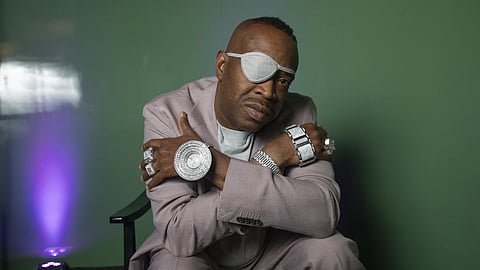
- LIFESTYLE
- FASHION
- FOOD
- ENTERTAINMENT
- EVENTS
- CULTURE
- VIDEOS
- WEB STORIES
- GALLERIES
- GADGETS
- CAR & BIKE
- SOCIETY
- TRAVEL
- NORTH EAST
- INDULGE CONNECT

Hip-hop icon Slick Rick has made a long-awaited return with Victory, his first full-length album since 1999. The visual album, released this week, is a bold and imaginative re-entry into the scene, blending the veteran rapper’s signature narrative flair with elements of reggae, house and soul.
The 60-year-old British-American artist—born Richard Walters—is best known for genre-defining tracks like Children’s Story, Mona Lisa, and La Di Da Di with Doug E. Fresh. His storytelling style, unmistakable delivery, and eye-patch have become cultural hallmarks. Now, after nearly three decades, he’s back—not to reclaim a throne, but to remind audiences that storytelling in hip-hop still has room to grow. “Your mentality has to grow with you,” he says. “You can’t always be children. We grow and talk about things that interest us at this age.”
One of the more unexpected collaborations on the album is Emmy-nominated actor and DJ Idris Elba, who serves as executive producer and features on a track. Their partnership began casually. “We met at a party, clicked, and his people reached out,” Slick Rick recalls. “They flew me to England and France. We just hung out, made music, and had fun.”
The album, mostly self-produced by Slick Rick himself, took four years to complete. Elba’s involvement was more than cosmetic—he provided both creative input and support as Rick shaped his vision across continents, recording in London and France while filming visuals in the U.S., U.K. and Africa.
In a world of short attention spans and endless streaming options, Slick Rick opted to release Victory as a visual album. The move, he says, was partly about efficiency. “People make songs and do videos anyway. Why not put it all together? It’s like watching a movie,” he explains. “Not only do you hear my voice and the music, you get the visual picture as well.”
The result is an album that functions as both an auditory and cinematic experience, showcasing his artistic evolution without discarding what made him iconic in the first place.
Victory draws from a wide range of influences beyond traditional hip-hop. “It’s what Black people like,” Rick says, pointing to the album’s incorporation of house, reggae, and soul. “We go all over the place—Barry Manilow, Dionne Warwick, Diana Ross. We try to entertain ourselves in different areas of existence.”
By doing so, he sidesteps the trap of genre rigidity, opting instead for a sound that mirrors the complexity and fluidity of his storytelling.
Though storytelling has long been a core part of hip-hop, Rick sees it as an underused tool in today’s music. “It hasn’t been filled, that space,” he says. “Before it gets too lost in just braggadocio or one frequency, we’ve got to expand. Be romantic. Be humorous. Be vulnerable. Go all over. Be a politician. Use your imagination.”
His message to younger artists is clear: take risks. Use hip-hop not just to boast or brand, but to build narratives and worlds that invite imagination.
Despite the 26-year gap since his last album, Slick Rick’s approach to creativity remains strikingly current. He’s not interested in nostalgia or rehashing the past. Instead, Victory serves as a bridge—between generations, between genres, and between formats—inviting listeners to reconnect with the roots of storytelling while imagining where it might go next.
For more updates, join/follow our WhatsApp, Telegram and YouTube channels.